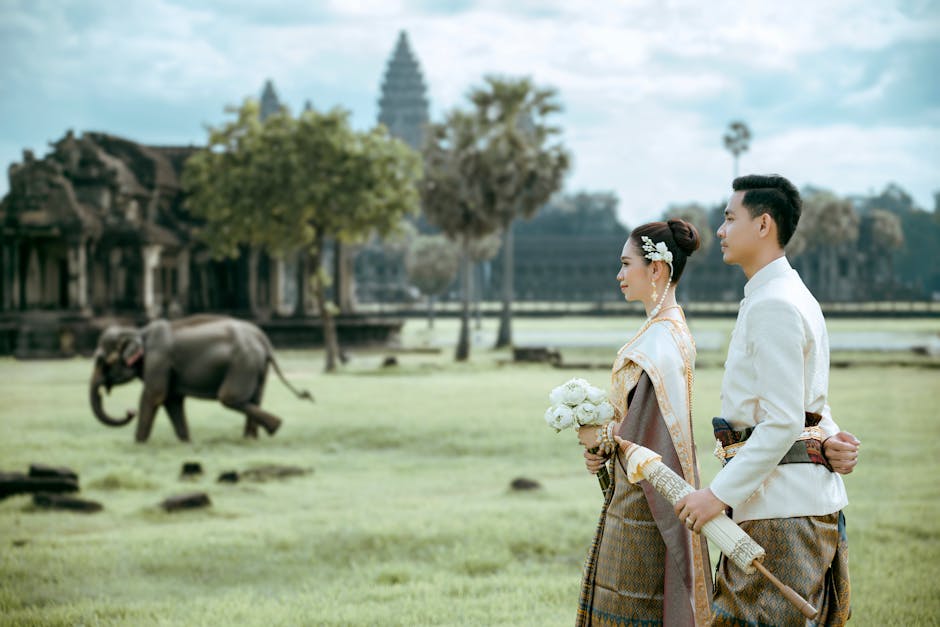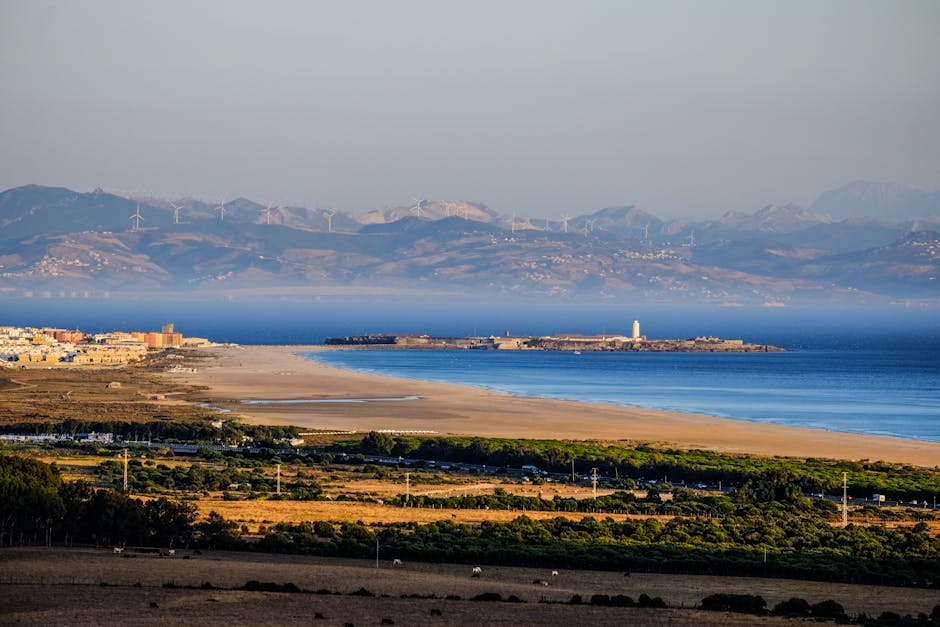Thailand's Tourism Transformation: A Local's Guide to What's New & What to Expect

Thailand's Tourism Transformation: A Local's Guide to What's New & What to Expect
Hey there, fellow traveler! If you're anything like me, the mention of Thailand conjures up images of sun-drenched beaches, ornate temples, bustling markets, and of course, mouthwatering street food. But Thailand, my friends, is constantly evolving, especially its tourism scene. Having lived here for a good chunk of my life, I've seen firsthand how things have changed, and I want to share my insider perspective on what you can expect on your next visit. It's not just about the classic tourist traps anymore (though those are still worth a visit!), but about a deeper, more sustainable, and more authentic experience.
Beyond the Beaches: A Shift Towards Sustainable Tourism

Let's be honest, for years, Thailand's tourism focused heavily on mass tourism. Think crowded beaches in Phuket, wild parties in Koh Phangan, and elephant rides that often weren't ethically sound. While these experiences still exist, there's a noticeable and welcome shift towards sustainable tourism. What does that mean for you? It means:
More Eco-Conscious Options: You'll find more eco-lodges, tours that prioritize environmental protection, and restaurants committed to using locally sourced ingredients. Look for certifications like the "Green Globe" or "Travelife Partner" to ensure the business is genuinely committed to sustainability.
A Focus on Community-Based Tourism (CBT): CBT initiatives are popping up all over the country, allowing you to connect directly with local communities, support their livelihoods, and learn about their culture in an authentic way. Imagine staying in a homestay in a rural village, learning traditional weaving techniques, or helping with a local reforestation project. It's a win-win! You get a unique experience, and the community benefits directly from your visit.
A Growing Awareness of Ethical Animal Tourism: The days of riding elephants are slowly (but surely!) fading. More sanctuaries are offering ethical elephant encounters, where you can observe these magnificent creatures in their natural habitat, learn about their rescue stories, and support their rehabilitation without contributing to their exploitation. Always do your research beforehand to ensure the sanctuary is truly ethical.
My personal experience: I recently visited a community-run eco-lodge in Chiang Mai. The lodge was built using sustainable materials, the food was all locally sourced, and the activities focused on exploring the surrounding rainforest and learning about the local Karen culture. It was an incredibly enriching experience that left me feeling good about my impact on the environment and the local community. This shift towards responsible travel makes a world of difference, and it encourages conscious travel overall!
Digital Nomads and the Rise of Remote Work in Thailand

Thailand has always been a popular destination for backpackers and budget travelers, but in recent years, it's become a haven for digital nomads and remote workers. The combination of affordable living, beautiful scenery, delicious food, and reliable internet access (in most areas) makes it an incredibly attractive place to base yourself.
What to Expect:
- Co-working Spaces Galore: Major cities like Bangkok, Chiang Mai, and even some of the islands now boast a thriving co-working scene. You'll find everything from basic shared workspaces to luxurious facilities with all the amenities you need to stay productive.
- Digital Nomad Communities: You'll easily find online and offline communities of digital nomads, offering support, networking opportunities, and social events. This can be a great way to meet like-minded people and get tips on living and working in Thailand.
- Longer-Stay Visas: The Thai government is increasingly recognizing the importance of attracting digital nomads and is offering various longer-stay visa options, making it easier to stay for extended periods. Be sure to research the different visa options available and find one that suits your needs.
My Tip: Chiang Mai is often considered the digital nomad capital of Thailand, and for good reason. It has a laid-back atmosphere, a strong sense of community, and a lower cost of living than Bangkok. However, don't overlook other cities like Phuket (if you want to be near the beach) or even smaller towns like Pai (if you're looking for a more bohemian vibe).
Gastronomic Adventures: Beyond Pad Thai

Thai food is, without a doubt, one of the biggest draws for tourists. And while Pad Thai and Green Curry are undoubtedly delicious, there's so much more to explore! The culinary scene in Thailand is incredibly diverse, with each region boasting its own unique flavors and dishes. My suggestion? Ditch the tourist traps and venture off the beaten path to discover the true culinary heart of Thailand.
Here's what to look for:
- Regional Specialties: Northern Thai cuisine is known for its rich and spicy flavors, with dishes like Khao Soi (a coconut curry noodle soup) and Sai Oua (Northern Thai sausage) being must-tries. Southern Thai cuisine is heavily influenced by Malaysian and Indonesian flavors, with dishes like Massaman Curry and Roti being popular choices.
- Street Food Stalls: Street food is an integral part of Thai culture, and it's where you'll find some of the most authentic and delicious food. Be adventurous and try something new! Don't be afraid to ask locals for recommendations.
- Cooking Classes: Taking a Thai cooking class is a great way to learn about the ingredients and techniques that go into making Thai food. You'll also get to enjoy the fruits of your labor!
My Favorite Discovery: During my travels through Isan (Northeastern Thailand), I stumbled upon a tiny street food stall selling Gaeng Om, a flavorful and spicy herbal stew, and sticky rice served in a bamboo basket. It was unbelievably good and a far cry from the tourist-oriented dishes I had tried elsewhere. Take the time to explore regional varieties!
Embracing Wellness Tourism: Rejuvenation for Mind, Body, and Soul

Thailand has long been a popular destination for spa treatments and massages, but wellness tourism is taking on a whole new dimension. It's not just about pampering yourself with a luxurious spa day (though that's definitely still an option!), but about integrating wellness practices into your entire travel experience.
What's Evolving:
Yoga and Meditation Retreats: You'll find numerous yoga and meditation retreats across the country, from beachfront studios in Koh Samui to peaceful mountain retreats in Chiang Mai. These retreats offer a chance to disconnect from the stresses of everyday life and reconnect with yourself through mindfulness practices.
Detox and Wellness Programs: Many resorts and wellness centers offer comprehensive detox and wellness programs that combine healthy eating, exercise, and spa treatments to help you cleanse your body and rejuvenate your mind.
Thai Massage and Traditional Medicine: Thai massage is an ancient healing art that combines acupressure, assisted yoga postures, and Ayurvedic principles to relieve muscle tension, improve circulation, and promote overall well-being. You can also explore traditional Thai medicine practices, such as herbal remedies and traditional healing ceremonies.
Personal Reflection: I spent a week at a yoga retreat in Pai, and it was one of the most transformative experiences of my life. The daily yoga classes, meditation sessions, and healthy meals helped me to feel more grounded and centered. It was a great way to reset and return to my daily life with renewed energy and focus.
Respecting Local Culture: A Guide to Responsible Travel

While Thailand is a welcoming and tolerant country, it's important to be respectful of local customs and traditions. Showing respect for Thai culture will not only enhance your travel experience but also help you to build genuine connections with the local people. Here are a few key things to keep in mind:
Dress Modestly: When visiting temples or other religious sites, dress modestly by covering your shoulders and knees. Avoid wearing revealing clothing in public places. This is very important to the Thai people and often overlooked by visitors.
Be Mindful of Your Gestures: Avoid pointing your feet at people or objects, as this is considered disrespectful. The head is considered the most sacred part of the body, so avoid touching someone's head without their permission.
Learn a Few Basic Thai Phrases: Even knowing a few basic Thai phrases like "Sawasdee" (hello) and "khop khun" (thank you) can go a long way in showing your respect for the local language and culture. Thai people will be delighted you are making the effort!
Bargain Respectfully: Bargaining is common in markets and street stalls, but do so respectfully and with a smile. Don't try to drive the price down too low, and remember that a small amount of money can mean a lot to the vendor.
My Experience: On one occasion, I witnessed a tourist yelling at a street vendor because they didn't want to pay the asking price. It was embarrassing and disrespectful, and it created a negative impression of tourists in general. Remember, a little kindness and understanding can go a long way.
The Future of Thai Tourism: Embracing Technology and Innovation

Thailand's tourism industry is rapidly embracing technology and innovation to enhance the visitor experience and improve efficiency. From online booking platforms to digital payment systems, technology is playing an increasingly important role in shaping the future of Thai tourism.
What You Can Expect:
Seamless Booking and Transportation: You can easily book flights, hotels, tours, and transportation online through various platforms. Ride-hailing apps like Grab are widely available in major cities, making it easy to get around.
Digital Payment Systems: Many businesses are now accepting digital payments through mobile apps like PromptPay and credit cards. This makes it easier and more convenient to make purchases, especially in tourist areas.
Smart Tourism Initiatives: The Thai government is investing in smart tourism initiatives to improve the visitor experience, such as providing real-time information on traffic, attractions, and events through mobile apps and online platforms.
Virtual Reality and Augmented Reality: Some museums and historical sites are using virtual reality and augmented reality technologies to enhance the visitor experience, allowing you to explore these places in new and immersive ways. I've virtually toured the ancient city of Ayutthaya, and it was remarkably immersive!
Final Thoughts: Thailand Awaits with Open Arms

Thailand is a country that truly has something to offer everyone. Whether you're seeking adventure, relaxation, cultural immersion, or culinary delights, you're sure to find it here. By being a responsible and respectful traveler, you can help to ensure that Thailand remains a beautiful and welcoming destination for generations to come. So, pack your bags, book your flights, and get ready for an unforgettable adventure in the Land of Smiles! Just remember to embrace the changes, be open to new experiences, and respect the local culture, and you're sure to have an amazing time. Safe travels!
Post a Comment